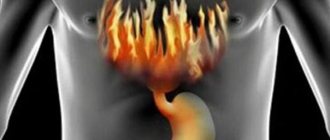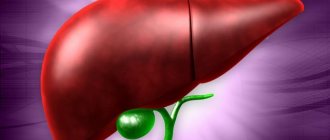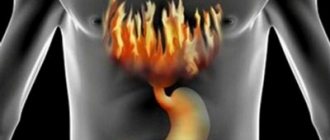The appearance of nausea, weakness and diarrhea indicates a general malfunction of the body. These symptoms may be accompanied by vomiting and false urge to defecate.
To determine the causes of problems, you should consult a doctor in a timely manner. The specialist will prescribe the necessary diagnostic tests and select treatment.
Main reasons
The most common cause of diarrhea and weakness is food poisoning. It is associated with the consumption of low-quality or spoiled food. Most often, the appearance of diarrhea is caused by the ingestion of pathogenic bacteria that pose a danger to humans.
In addition to these symptoms, vomiting and weakness are usually observed. In this way, the body tries to remove toxic substances. If the pathology is acute and does not go away for a long time, you should consult a specialist.
In addition to poisoning, intestinal infection can cause weakness, diarrhea and nausea. At the initial stage, its clinical picture is largely reminiscent of signs of food intoxication.
However, as the disease develops, there is a risk of increasing severity of the clinical picture. The person becomes seriously unwell and may experience an increase in body temperature.
Nausea, vomiting, diarrhea and weakness can be caused by bacteria and parasites. In any case, loose stools must be treated immediately, otherwise there is a risk of dangerous health consequences.
What to do if you feel dizzy, nauseous and have diarrhea
Diarrhea is a common disorder for many people and is often caused by certain infections.
Often, diarrhea can be accompanied by dizziness, and in this case it is important to undergo an examination, since these may be signs of serious abnormalities and without treatment there may be complications.
Diarrhea often occurs as a result of bacteria and other pathogenic microorganisms. In this case, people will have a number of symptoms:
- Nausea and vomiting appear, which can last for several days
- There is general weakness in the body.
- There may be frequent dizziness
- Lost appetite.
- Pain of varying intensity appears in the abdomen, which often occurs at the time of bowel movements or during meals.
- Body temperature increases.
- Your head may hurt.
Dizziness, diarrhea and nausea, together with a general loss of strength, do not allow a person to work normally and the quality of life deteriorates significantly.
In some cases, it is difficult to establish the exact causes, since the symptoms may indicate gastrointestinal diseases, of which there are quite a few.
The doctor can roughly determine the causes by the intensity and type of pain, as well as by stool. For a more accurate diagnosis, you will need to undergo an examination and tests.
After determining the cause, the doctor prescribes the necessary treatment. At home, it is not easy to remove dizziness and diarrhea on your own, because vomiting almost always occurs, which worsens the condition.
There are several main reasons that will result in dizziness, diarrhea and other symptoms:
- Food poisoning. In this case, the person’s temperature begins to increase, nausea begins, and the diarrhea itself can last for several days. Dizziness occurs as a result of dehydration.
- Rotavirus infection. This pathology, in other words, is called intestinal flu and can cause a lot of discomfort and weakness in the body.
- Salmonellosis, dysentery and other infectious diseases of the gastrointestinal tract.
- Infection with bacteria, especially Helicobacter pylori infection, which contributes to peptic ulcers.
- Dizziness and diarrhea may occur with gastroenteritis.
- The reasons may be constant emotional stress, stress and anxiety.
- In adolescence and in women, problems arise due to hormonal changes.
- Diseases and disorders of the nervous system.
The described causes must be found and treated, as they can cause complications and other diseases.
Dizziness and diarrhea can be treated with different methods, but medications and dietary adjustments are mainly used.
When a person begins to experience nausea, vomiting, diarrhea and dizziness, while the temperature rises, these symptoms may indicate poisoning or intestinal flu.
The symptoms are quite similar to each other, but there are several distinctive features by which pathologies are distinguished:
- Nausea and vomiting accompanied by diarrhea indicate poisoning of the body. As a rule, deterioration of the condition appears almost immediately after poisoning and after some time weakness appears in the body.
- If the stool becomes liquid, yellow in color, and has a sour aroma, then the symptoms often indicate a rotavirus infection. Also, this pathology is characterized by vomiting, which will be constant and does not go away for several hours.
- If a person has the cause of the disorder due to salmonellosis, then diarrhea and vomiting occur, and dizziness appears very rarely, and the temperature remains normal or rises slightly.
All infectious diseases of the intestines in people begin with pain in the gastrointestinal tract, followed by headaches, dizziness, and pieces of food can be seen in the stool. This is due to the fact that the stomach is not able to properly digest foods.
Dizziness can occur with almost any pathology, and weakness almost always occurs. A dangerous symptom is diarrhea, which contains mucus or blood.
In this case, it is better to call an ambulance, since certain organs in the body are seriously ill.
You should also call an ambulance if there is blood in the vomit, as it should not be there under any circumstances.
If the cause of the disorder is poisoning, then the unpleasant sensations are relieved quite quickly and relief occurs in 2-3 days, but with other diseases, especially infectious ones, dizziness, diarrhea, and weakness will last a long time.
As a rule, when there is weakness, vomiting, and dizziness, a person refuses to eat, but doctors do not recommend fasting.
In this case, it is necessary to use a certain diet, which can reduce the development of the disease and discomfort.
To adjust your diet, you must use the following rules:
- Any dairy products are removed from the diet.
- It is forbidden to eat fresh fruits, berries and vegetables.
- You need to give up harmful and heavy foods, for example, spicy, smoked, fatty and fried foods, since such food only complicates the functioning of the gastrointestinal tract and also makes the body vulnerable.
- It is recommended to cook porridge in water.
- The basis of nutrition should include boiled, stewed and steamed dishes. You can cook vegetables, meat (not fatty) or fish.
- It is recommended to consume plenty of water and other liquids to flush out the stomach. Due to this, weakness and nausea will disappear.
Meals during treatment should be in small portions and often. This will not allow the gastrointestinal tract to be loaded. You need to eat without haste, chewing every piece of food thoroughly.
Be sure to give up soda, alcohol and fast food products.
When you feel dizzy and have nausea and diarrhea, you can’t immediately tell what medications you can and should not take.
Treatment with medications depends on the cause of the disorder, which can be determined by the doctor after diagnosis.
But there is a general list of drugs that can help and are used in medicine:
- Vomiting, diarrhea and other symptoms cause dehydration, which can lead to headaches and dizziness. At this time, it is necessary to restore and constantly replenish the water balance, and the Regidron solution is perfect for this.
- Sorbents can be used to normalize microflora, as well as to help the body fight infection. For this purpose he uses Smecta and Enterosgel.
- If there is an increase in temperature and a headache, it is recommended to drink Nurofen and Paracetamol.
- To restore the intestinal microflora, Linex and Acipol are used.
- If nausea, weakness and other symptoms begin due to bacterial pathologies, then doctors prescribe Levomycetin, Ciprofloxacin, Ceftriaxone.
- To facilitate absorption in the gastrointestinal tract, enzymatic preparations “Pancreatin” and “Creon” are used.
In some cases, doctors may prescribe stronger drugs, namely antibiotics. Such drugs are used if an infection enters the body, which causes certain diseases.
Additionally, anti-vomiting medications are prescribed. This treatment is used when nausea, pain, and dizziness do not go away within 2 days of treatment.
Additionally, vitamin complexes are prescribed for quick recovery.
Using the recommendations and instructions of doctors, as well as adjusting your diet, you can quickly get rid of discomfort and illness.
Traditional medicine can be used as additional therapy. Suitable for these symptoms:
- Rice water. You need to add 5-6 tbsp per 500 ml of water. rice and cook it for about 40 minutes over low heat, then strain and drink until the diarrhea goes away.
- Parsley infusion. You can relieve dizziness with an infusion of parsley seeds. To do this, for 1 tsp. seeds, add a glass of boiling water and after 8 hours you can drink it. The drink should be used throughout the day before meals.
- Potato starch. This folk remedy will quickly relieve diarrhea. Enough for 1 tsp. raw materials add 250 ml of boiling water and drink every hour until the discomfort goes away.
The remedies described will help if you feel dizzy and have diarrhea and can be used as first aid. Further treatment should be prescribed by a doctor.
source
Professional skills: Colon hydrotherapy, treatment of gastrointestinal diseases
Any ailment has several signs. This is due to the fact that when any organ becomes ill, the functioning of the organs and systems associated with it is disrupted. Dizziness and diarrhea have a variety of causes, and to determine the true cause, consultation with a specialist is necessary.
The mechanism of diarrhea in different diseases is different. Most often it is associated with impaired absorption of fluid by the intestinal walls. At the same time, too much water remains in the fecal matter. Another option is a decrease in the ability to digest food, associated with insufficient amounts of food enzymes, beneficial bacteria, and bile. In this case, diarrhea is caused by a large amount of undigested food, which must be eliminated as quickly as possible.
Dizziness is a vestibular disorder. Associated with damage to the vestibular nuclei, cerebral cortex, and cerebellum. Very often the cause of the disorder is circulatory disorders. In this case, dizziness is often accompanied by nausea.
At first glance, dizziness and diarrhea are not related. But in reality they serve as signs of many diseases.
- Food poisoning. Eating low-quality, spoiled or simply unusual foods often leads to diarrhea. In this state, partial dehydration occurs and, accordingly, blood circulation is somewhat impaired. This is enough to cause headaches and dizziness.
- Enzyme deficiency . Inflammation of the gastrointestinal tract, pancreatitis, dysbiosis, and diabetes reduces the synthesis of various substances necessary for digesting food. Its remains are excreted from the intestines with a large amount of water, which leads to diarrhea. In this case, toxic substances formed as a result of incomplete digestion enter the blood, and the patient experiences signs of intoxication: dizziness, severe weakness, nausea.
- Cirrhosis, celiac disease, enteritis . The same signs as with enzyme deficiency appear in any of the diseases associated with impaired absorption of certain substances.
- Flu, ARVI . Intoxication that occurs during the flu, with purulent complications, leads to dizziness against the background of the underlying disease.
- Infectious diseases. Dysentery, salmonellosis, botulism are accompanied by diarrhea, vomiting, severe weakness and dizziness.
- Neurosis, stress, psychopathy . In these conditions, the functioning of the central nervous system is disrupted, which provokes diarrhea and dizziness at the same time.
- Ischemia, colitis, Crohn's disease . These inflammatory diseases cause not only diarrhea and dizziness, but also nausea and severe abdominal pain.
Important! If the disorder is observed sporadically, it does not cause negative consequences. Constant dizziness and diarrhea indicate pathology.
Diarrhea and dizziness are observed in many diseases. The nature of the disorders, as well as other accompanying signs, help to establish the true cause of the ailment.
- With an infectious disease, symptoms develop very quickly. Already 2-3 hours after infection, diarrhea begins, nausea, and severe dizziness. Distinctive sign: severe abdominal pain, lack of blood and mucus in the stool. An examination is required to identify the causative agent of the disease.
- Problems with the autonomic nervous system provoke migraines, dizziness and nausea. Diarrhea and fever appear secondarily. Malaise is often accompanied by nasal congestion, difficulty breathing, and weakness. Fever is very rare.
- With a peptic ulcer, especially in the acute stage, diarrhea and dizziness often appear. The ulcer is accompanied by severe pain. A sharp, dagger-like pain is a sign of perforation of the stomach wall.
- With gastritis of various origins , dizziness occurs, diarrhea appears, nausea occurs, turning into vomiting. There is profuse salivation, which is considered a characteristic sign of the disease.
Diarrhea and dizziness can be permanent not only with illness, but also with constant overeating, abuse of fatty and spicy foods. In such cases, the signs are blurred, sometimes disappear, but reappear with enviable regularity.
If dizziness, vomiting and loose stools develop gradually and are not accompanied by pain, you can wait to see a doctor and limit treatment to diet. If symptoms develop rapidly, you should consult a doctor immediately.
Other factors
The appearance of diarrhea, nausea and weakness may indicate the development of dangerous pathologies. Most often we are talking about diseases of the digestive system. These include the following:
- Gastritis;
- peptic ulcer of the stomach or duodenum;
- bleeding from the digestive organs.
The appearance of nausea and vomiting may indicate a relapse of chronic gastritis. The most common cause is dietary disturbances. Pieces of food can be seen in the vomit.
More rare causes include:
- Stressful situations and increased emotional stress. The appearance of such symptoms is due to an increase in the level of adrenaline in the blood.
- Infections. Viral pathologies can provoke not only weakness, chills and fever, but also loose stools. This is due to a violation of the intestinal microflora or the use of medications.
- Menstruation. Many women experience stool disturbances and nausea during menstruation. Bloating, headaches and dizziness often occur.
Help: prescriptions and medications
Treatment of dizziness with nausea and loose stools at home is only possible for mild illnesses or eating disorders. If the cause of the disease has been identified, feel free to follow the doctor’s advice and do not forget to discuss with him any innovations in therapy.
If it is known for sure that nausea and other causes are the result of an eating disorder or poisoning, take sorbents. The most effective of them are Smecta, Polysorb; activated carbon has slightly less benefits for the stomach. These substances are able to absorb everything harmful and remove most toxins from the body within 6-7 hours after use.
Contact your doctor if you experience any of the following symptoms:
- if a child complains about them;
- if no improvement is observed within 2-3 days;
- the symptoms only get worse;
- dehydration occurs, which can be determined by dry mucous membranes, thirst, dark color of urine, as well as by the appearance of severe weakness;
- severe pain appears in the stomach;
- blood appears in diarrhea, the same vomiting occurs;
- the temperature rises.
You can get rid of the symptoms that accompany diarrhea using folk remedies. The use of medications is mandatory if they do not help.
Causes of illness in children
In children, such symptoms may be caused not only by digestive disorders. Common factors include:
- Increased intracranial pressure. In this case, the child also has a headache.
- Binge eating. If you consume too much food, your baby may feel nauseous, and there will be a feeling of fullness and pain in the stomach.
- Weakness of the vestibular apparatus. Children can quite often vomit in transport. Therefore, they should not be given food or drink before the trip.
- Stressful situations. Nausea, diarrhea and weakness in a child can appear with excitement and high nervous tension. In such a situation, it is important to calm the baby down and offer him to do breathing exercises.
- Allergic reactions. If nausea and diarrhea occur in a child without fever, food and drug allergies can be suspected. In such a situation, you need to consult an allergist.
When urgent doctor's help is needed
If dizziness, vomiting and loose stools develop gradually and are not accompanied by pain, you can wait to see a doctor and limit treatment to diet. If symptoms develop rapidly, you should consult a doctor immediately.
First of all, this concerns poisoning. It is necessary to induce vomiting in the victim, and if possible, rinse the stomach. Then the patient is given strong tea or coffee to drink. An ambulance should be called before all activities are carried out.
In case of drug poisoning, the stomach is also washed and a sorbent is given. If necessary, perform artificial respiration. If the temperature is high, you should call a doctor in any case. Before his arrival, the patient is given an antipyretic.
Important! If the cause of diarrhea and dizziness was poisoning, then relief occurs after vomiting and gastric lavage.
Features of the clinical picture
To make an accurate diagnosis, you should analyze the existing symptoms. When consuming low-quality products, poisoning develops. It is accompanied by inflammatory damage to the stomach and the appearance of severe pain. After a certain time, nausea and diarrhea occur. The main symptoms of food poisoning include the following:
- Sudden onset of rumbling in the stomach;
- severe nausea;
- increase in temperature;
- vomit;
- cold sweating;
- bloating;
- diarrhea.
Poisoning begins with abdominal pain and nausea. The clinical picture of intestinal infection is slightly different. The development of pathology begins with severe vomiting and diarrhea. A person's temperature increases and weakness occurs. In this case, pain syndrome may be absent.
When there is a disease of the digestive system, other signs appear. Gastritis, peptic ulcer, hepatitis, pancreatitis are usually characterized by the following symptoms:
- Nausea;
- diarrhea;
- vomit;
- stomach pain;
- sour belching;
- flatulence.
With intestinal pathologies, pain in the lower abdomen is cramping in nature and is accompanied by severe diarrhea. When the disease worsens, there is a risk of weakness and disturbances in the functioning of the heart, which is associated with dehydration of the body.
Why does it happen?
Diarrhea is not an independent pathology; it is always a signal of some kind of trouble in the human body.
Main reasons:
- Poor nutrition - poor or monotonous food, predominance of fats or carbohydrates in the daily diet, food excesses, consumption of unusual foods, alcohol, too much food, etc.
- Insufficiency or poor quality of produced digestive enzymes in congenital (lack of lactase) or acquired diseases (for example, diabetes, cholecystitis, pancreatitis).
- Impaired absorption of certain nutrients in the intestine - primary malabsorption (celiac disease, cystic fibrosis) or secondary (with cirrhosis of the liver, chronic enteritis, oncology).
- Infectious diseases - viral (rotavirus, enterovirus), bacterial (dysentery, salmonellosis) or parasitic (amoebiasis, giardiasis).
- Inflammatory diseases - ulcerative colitis, Crohn's disease, ischemic or radiation damage to the intestine.
- General intoxications - with influenza, purulent diseases, septic conditions.
- Neuroses and psychopathy as a cause of intestinal irritation, increased peristalsis and diarrhea.
Treatment methods
When unpleasant symptoms appear, it is very important to take action immediately, otherwise there is a risk of dangerous consequences. One of them may be serious dehydration of the body. Treatment should consist of the following:
- On the first day you need to completely eliminate food intake.
- It is very important to provide the patient with plenty of fluids. Preference should be given to ordinary boiled water with rehydron. You can also drink mineral water without gas.
- If food poisoning is suspected, cleanse the stomach.
- The patient can be given activated charcoal.
- If a person's condition does not improve, they should immediately consult a doctor.
Note to parents. If severe weakness, nausea, diarrhea, or high fever occurs in a child, you should immediately call an ambulance. The specialist will be able to assess the baby’s condition and, if necessary, hospitalize him in the infectious diseases hospital.
The appearance of general weakness, stool disturbances and nausea can be a symptom of a variety of pathologies. To make an accurate diagnosis and begin proper therapy, you should consult a doctor in a timely manner.
Why does it happen?
Diarrhea is not an independent pathology; it is always a signal of some kind of trouble in the human body.
It can appear as a defensive reaction in response to dietary errors or as a symptom of various diseases.
Main reasons:
Poor nutrition - poor or monotonous food, predominance of fats or carbohydrates in the daily diet, food excesses, consumption of unusual foods, alcohol, too much food, etc. Insufficiency or poor quality of digestive enzymes produced in congenital (lack of lactase) or acquired diseases ( for example, with diabetes, cholecystitis, pancreatitis). Impaired absorption of certain nutrients in the intestine - primary malabsorption (celiac disease, cystic fibrosis) or secondary (with cirrhosis of the liver, chronic enteritis, oncology). Infectious diseases - viral (rotavirus, enterovirus), bacterial (dysentery, salmonellosis) or parasitic (amebiasis, giardiasis). Inflammatory diseases - ulcerative colitis, Crohn's disease, ischemic or radiation damage to the intestines. General intoxication - with influenza, purulent diseases, septic condition. Neuroses and psychopathy as a cause of intestinal irritation, increased peristalsis and diarrhea.
What to do and how to treat associated symptoms
If you experience abdominal pain accompanied by diarrhea and vomiting, consult a doctor.
If you suspect diseases of the abdominal organs, you should not resort to independent treatment; incorrect assistance will lead to aggravation of the situation. In case of exacerbation of gastrointestinal pathologies, urgent surgical intervention is required.
You can eliminate unpleasant symptoms using certain medications.
- Toxins are removed from the body by taking sorbents. Activated carbon, Enterosgel, Polysorb, Enterol, Smecta, Sorbex, Atoxyl are considered effective.
- Antidiarrheal drugs are used to treat diarrhea - Nifuroxazide, Levomycetin, Imodium, Loperamide, Hilak forte, Diaremix. Depending on the cause of the disorder, it is necessary to use antibiotics, probiotics, agents to reduce intestinal motility, and anti-inflammatory drugs.
- Diazepam, Lorazepam, Motilium, Betagistin, Pipolfen stop vomiting.
- Abdominal pain is relieved with analgesic drugs. No-Shpa, Paracetamol, Nurofen (Ibuprofen), Spazmalgon, Festal, Diclofenac, Ranitidine, Cerucal, Omez will help relieve pain spasms.
- To improve intestinal function, it is recommended to use bacterial preparations - Yogurt, Linex, Lactovit, Enterozermina, Bifidumbacterin, Lactulose, Lactofiltrum.
Taking medications is possible after consultation with a doctor. If abdominal pain, diarrhea and vomiting occur in a child, self-medication is strictly prohibited.
To prevent dehydration, a person should be provided with adequate fluids. If a patient has diarrhea and vomiting at the same time, the body loses a lot of fluid, which is quite dangerous. The condition needs to be treated. Drink warm boiled mineral water without gas. During treatment, adhere to a food diet. Give preference to rice dishes.
A person needs to understand that the development of symptoms is dangerous to health and life. The use of drugs and therapeutic actions must be discussed with a doctor. Otherwise, the person takes responsibility for possible negative consequences upon himself.
Diagnostic measures
All patients with severe digestive disorders, the symptoms of which cannot be controlled at the prehospital stage, are subject to examination in a hospital setting. Initially, the doctor will collect an anamnesis - the fact of possible consumption of low-quality products, the duration of diarrhea, stool consistency, color and smell of stool are important.
Then the abdomen is palpated, stool, urine and blood tests are prescribed - general and in some cases biochemical. In the presence of vomiting, vomit is also subject to laboratory testing. Instrumental diagnostic methods include ECG and Echo ECG.
Why do symptoms occur?
Diarrhea, accompanied by mild nausea and dizziness, may occur due to illness or poor diet. And here are the specific reasons:
- Wrong diet. This can be either an abundance of fatty and low-quality food with trans fats, or a meager menu. Unusual foods and excess alcohol can lead to similar consequences.
- Reduced enzyme activity. Due to instability of the body as a result of certain diseases or lactose deficiency, the digestive process cannot be completed. Diabetes, pancreatitis or cholecystitis often leads to this condition.
- Improper absorption of nutrients - celiac disease, cystic fibrosis, cirrhosis, oncology or enteritis.
- Infectious lesions – viral or bacterial infections, as well as parasitic infestations.
- Inflammatory processes in the intestines , including ischemia, radiation damage, colitis and Crohn's disease.
- Intoxication of the body - during the flu, with purulent diseases or sepsis.
- Neuroses and psychopathy are severe psychological conditions that can lead to severe nausea, diarrhea and dizziness.
Methods of therapy and prevention
This is a very bad sign when the patient has pain in the head area. If this pain is observed in combination with abdominal cramps, the suffering only intensifies.
Sometimes the problems are unrelated and require separate treatment, but often they arise due to the development of the same disease.
Some reasons that may cause both nausea and headache and stomach heaviness include viruses, premenstrual syndrome, pregnancy, stress, and side effects from certain medications.
It is always necessary to consult with your doctor, who will prescribe the best treatment at home and confirm that no further medical attention is required.
You can drink herbal tea. Some teas, especially mint and chamomile, have special beneficial properties, they soothe both headaches and intra-abdominal cramps.
There is an option to use compresses. Warm compresses soothe both abdominal cramps and headaches.
It is recommended to lie on your back in a dark room and place a heating pad or warm cloths on your stomach and head. Alternating hot and cold compresses on the head and neck can also be effective.
Headache and nausea can also be treated with medications. If a person suspects that their headache is caused by stress or tension, it is recommended to take Acetaminophen, which does not upset the stomach.
However, if the patient suffers from frequent headaches, he may experience temporary “attacks”, the causes of which are excessive dependence on medications (Ibuprofen or Acetaminophen).
It is advisable to eat foods that soothe the stomach. Abdominal pain that causes cramps and spasms usually indicates that the cause is not serious.
Pain may indicate excess gas in the stomach. The best foods to prevent this condition include:
- low-fat dairy products;
- applesauce;
- rice;
- crackers.
It is recommended to look for other symptoms or signs that will help the person determine the cause of the headache and abdominal discomfort (eg, dizziness, heaviness in the stomach).
If they are accompanied by fever, vomiting or diarrhea, the patient may develop viral gastroenteritis, known as stomach flu.
Tracking your menstrual cycle will often indicate to a woman whether PMS is causing similar symptoms.
If a woman is taking hormone therapy, cramps and headaches can sometimes be side effects.
It is worth seeking advice from a medical professional if a woman suspects she is pregnant or has a serious illness, including a bacterial or parasitic infection such as toxoplasmosis.
It is especially important to seek medical help if a person already has a serious illness that undermines the immune system and overall health, since a secondary illness can pose an even greater threat to patients.
A highly qualified doctor will determine the reasons for the appearance of certain symptoms in a sick person and tell you what to do in a given situation (how to treat a specific illness).
Causes of nausea, diarrhea and dizziness
Symptoms such as diarrhea, nausea, dizziness and weakness occur frequently, regardless of the person’s age and gender. They are physiological and pathological.
Physiological manifestations of general weakness and digestive disorders are episodic and do not cause negative consequences. Pathological nausea, diarrhea, dizziness are signs of the development of a serious condition, diseases that pose a threat to health and require urgent diagnosis and treatment .











